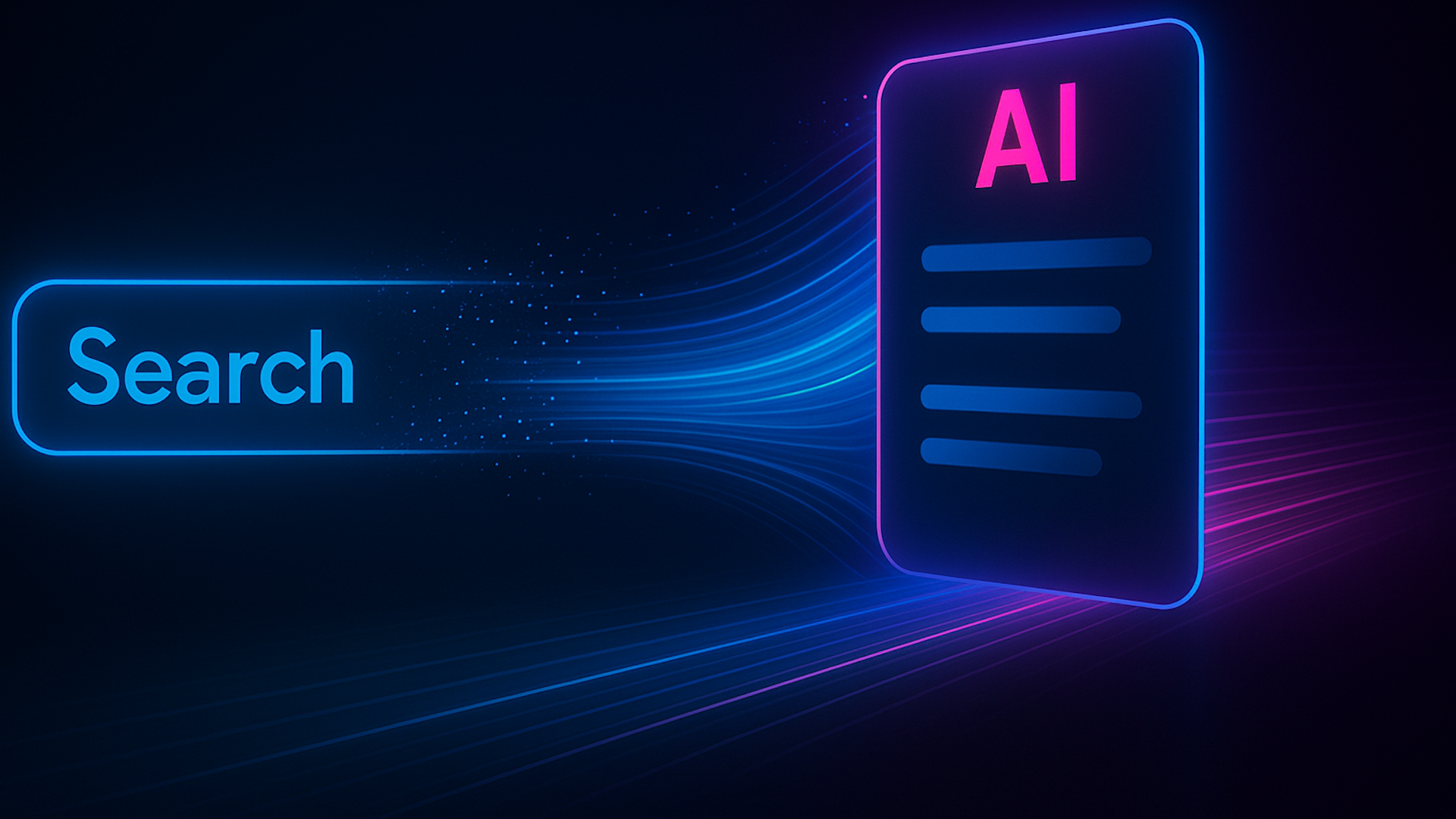Artificial Intelligence (AI) has become a major disruptor in the digital marketing world, and the biggest impact is now being seen in search engine optimisation (SEO). With AI-powered search results becoming smarter and more conversational, many businesses are starting to fear that their visibility in search rankings may soon drop. According to recent industry insights, around 90% of companies are worried about losing their SEO ranking positions as search behaviour continues to evolve through AI integration.
In this article, we’ll explore how AI is reshaping search, why so many companies are anxious about it, and what strategies can help businesses maintain strong online visibility in the new search era.
The Shift from Traditional Search to AI-Powered Search
For years, SEO was driven by algorithms that relied heavily on keywords, backlinks, and on-page optimisation. But now, with AI-driven search tools like Google’s Search Generative Experience (SGE) and conversational AI assistants, the game is changing. Search engines are no longer just providing a list of links; they’re offering instant answers and summarised information directly on the results page.
This shift means users are getting the information they need faster, but it also means fewer people are clicking through to websites. As a result, businesses that once relied on strong SEO strategies to drive organic traffic are now worried about losing their visibility.
Why Companies Are Afraid of Losing SEO Rankings
The fear among businesses isn’t just about losing rankings—it’s about losing traffic, leads, and ultimately, revenue. Here’s why this concern is growing so quickly.
AI is Reducing Organic Clicks
When AI tools summarise content directly in the search results, users have less reason to click on the original source. This leads to a drop in organic traffic, even for pages that rank well.
Search Results Are Becoming Personalised
AI-based algorithms now tailor search results to individual users based on their location, search history, and intent. While this improves user experience, it also makes it harder for businesses to predict or maintain consistent rankings across audiences.
Content Creation is Flooding the Web
With AI writing tools becoming more accessible, the internet is now full of automatically generated content. The massive increase in content makes it harder for quality pages to stand out, especially for small businesses competing against large corporations with greater resources.
SEO Metrics Are Changing
Traditional SEO success metrics like keyword ranking and backlinks are becoming less reliable. AI-driven search prioritises user engagement, context, and relevance—factors that are not always easy to optimise manually.
The Role of AI in Modern SEO
AI is not just changing search—it’s also transforming how SEO itself works. Marketers now need to adapt to smarter algorithms that focus more on meaning, not just keywords.
Smarter Keyword Understanding
AI can now understand the intent behind search queries instead of relying solely on keyword matching. For example, if a user searches for “best coffee near me,” the search engine doesn’t just look for those words but understands that the person wants a list of nearby cafés.
This means keyword optimisation alone isn’t enough anymore. Businesses must focus on providing high-quality, context-rich content that directly answers user queries.
Predictive Search and Voice Search
AI-powered predictive search tools suggest results before users even finish typing. Similarly, voice search has become more popular with smart devices like Alexa, Siri, and Google Assistant. These searches are often more conversational, forcing brands to adapt their content for natural language queries.
Content Relevance and User Experience
AI algorithms analyse how users interact with a page—how long they stay, how far they scroll, and whether they click other pages. These signals help search engines decide if a website truly satisfies the user’s intent. Websites that focus on quality, relevance, and experience now have a greater advantage than ever.
How Businesses Can Adapt to AI-Driven Search
While AI presents challenges, it also offers opportunities. Companies that act now can stay ahead by adapting their SEO strategies to align with AI-based search trends.
Focus on User Intent
Instead of stuffing keywords, businesses should understand why people are searching. Content should address user needs, solve problems, and provide meaningful answers. This approach helps improve visibility even as AI search evolves.
Use Structured Data
Structured data (schema markup) helps search engines understand website content better. It’s an important factor for AI systems that summarise results. Implementing schema markup increases the chance of being featured in AI-generated summaries or rich results.
Optimise for Voice and Conversational Search
As AI search becomes more conversational, brands should create content that mirrors how people talk. Use natural language, long-tail phrases, and FAQs to match voice search patterns.
Update and Repurpose Content
AI systems value freshness and relevance. Regularly updating blog posts, adding new insights, and improving readability can help maintain rankings. Repurposing content into different formats like videos or infographics can also boost visibility.
Partner with SEO Experts
Businesses that want to future-proof their online presence should consider working with an experienced SEO company in Delhi. Professional SEO teams understand how AI is transforming search and can develop customised strategies to adapt to these changes.
They can help with technical optimisation, content planning, link building, and analytics to ensure your business stays competitive even as AI search continues to evolve.
The Middle Ground: Embracing AI While Protecting SEO
The truth is, AI isn’t here to replace SEO—it’s here to improve it. Businesses that embrace AI tools can actually gain an advantage by using automation to analyse data, optimise content, and predict trends faster than ever before.
However, the key is to find the right balance between automation and human creativity. AI can suggest what works, but only humans can bring authenticity, storytelling, and emotional connection to content.
By leveraging AI insights while maintaining genuine, helpful content, businesses can maintain their visibility and even grow their traffic in the long run. At this stage, integrating AI-driven insights into your SEO strategy isn’t optional—it’s essential for survival in the digital space.
What the Future of SEO Looks Like
The future of SEO will revolve around smarter search engines, dynamic ranking systems, and AI-generated answers. Businesses that keep their strategies flexible will succeed. Here’s what’s likely to define SEO in the coming years.
- Hyper-personalised results will deliver unique outcomes for each user.
- Visual and voice search will continue to expand beyond text-based content.
- Content authenticity will gain more importance as search engines fight AI spam.
- User experience will dominate rankings, making page speed and accessibility critical.
This future may look uncertain to many companies, but it also presents new ways to innovate and connect with audiences more meaningfully.
Conclusion
AI is changing how people search and how search engines respond. While 90% of companies fear losing their SEO rankings, those who adapt early will have a huge advantage. The key is to focus on intent-driven, human-centric content while leveraging AI tools to improve accuracy, speed, and analysis.
By staying flexible, updating strategies, and working with the right SEO company in Delhi, businesses can not only protect their rankings but also thrive in this new era of intelligent search.
The future of SEO belongs to those who understand that AI is not an obstacle—it’s an opportunity to evolve, innovate, and grow.




Leave a Reply